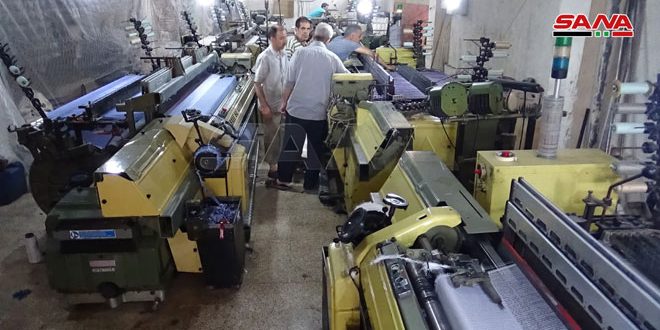ALEPPO, (ST)-The industrial areas of al-Arqoub, al-Kallasah and al-Qaterji are known for being among the most important and the oldest industrial zones in the Syrian province of Aleppo. They have worked distinctively for decades to contribute to supporting national economy and to build a good reputation in the entire Middle East.
These industrial areas have been the target of terrorism and vandalism over the years of the terrorist war on Syria. The industrialists suffered heavy losses as their facilities were destroyed or at least severely damaged due to terrorist attacks. However, after the Syrian army liberated these areas, the industrialists returned immediately to inspect the condition of their facilities in order to fix the damage and restart work.
Now, those industrialists are sparing no effort to develop and expand their facilities to boost their contribution to the country’s reconstruction and economic development.
Al-Arqoub industrial area, which concentrates on the manufacturing of production lines, packaging machines, spare parts and textile, plays an important role in boosting medium industries that support big industries in the country.
Abdul Naser al-Soufi, an owner of a factory for the manufacturing of plastic household tools and kids toys, told the Syrian News Agency (SANA) that “he returned to Syria after the area was liberated from terrorism. He said he rebuilt his destroyed factory, brought new machines and started work.
He called on concerned government parties to meet some production requirements such as increasing the hours of electric power feeding.
In al-Qaterji Industrial area, one can see that half of the industrial facilities is still destroyed while the other half has been re-operated. The area contains different industries including food.
 Industrialists in this area have proved great ability to work and start again despite all the destruction left by terrorists before being defeated.
Industrialists in this area have proved great ability to work and start again despite all the destruction left by terrorists before being defeated.
Abdo Ma’sarani, head of a sewing factory, said that after the liberation of Aleppo from terrorist organizations, his factory started to work again and created many job opportunities.
Shadi Radwan, the owner of a factory for manufacturing agricultural irrigation tools, said that he faced several obstacles, but with his firm determination and the cooperation of other fellow industrialists and many locals, he managed to surpass and overcome these difficulties.
The same situation is in al-Kallasa industrial area which has begun working intensively after the maintenance of the area’s infrastructure and electricity network and after the removal of the rubbles.
Mohammad Nadim Atrash, who possesses a textile company, said that the number of factories that returned to work after being liberated from terrorism has reached 1300. However, he added, not all the these factories are working in full capacity, calling for more facilitations to be offered to industrialists that help open land shipment roads for exportation to neighboring countries.
Hamda Mustafa

